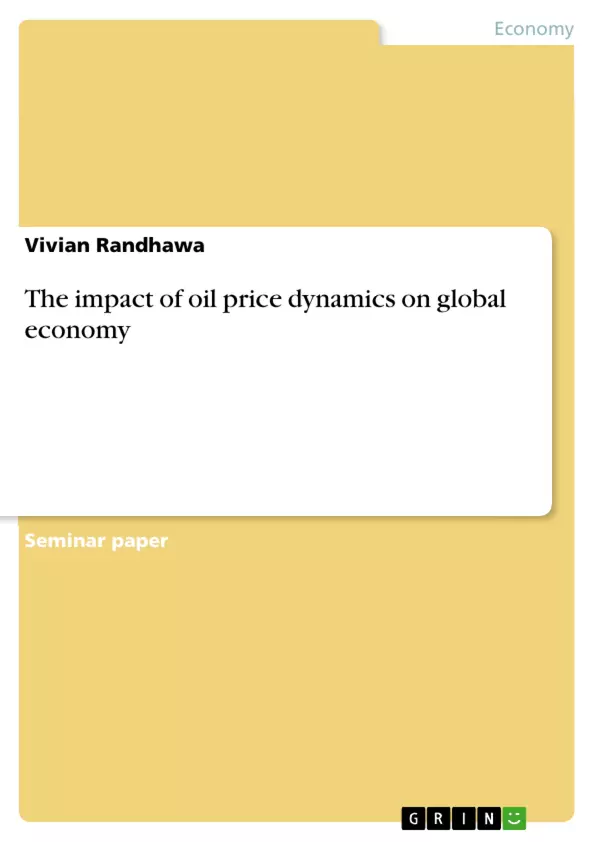After oil was discovered in the late 19th century, oil prices were primarily determined first by the major petroleum companies and then by the oil-exporting nations, who joined forces in the Organization of Petroleum Exporting Countries (OPEC). In the 1960s, the market-oriented pricing system was adopted and since then oil prices are primarily formed by supply and demand. Oil prices are characterized by permanent price fluctuations. Especially rapid price rises and longer-term fluctuations are at the focus of many scientific work.
Because oil is an indispensable resource for the global economy, the question arises after the economic impacts of such price developments. While oil- exporting countries benefit from strong price rises, oil- importing countries, with emerging countries leading the way, are negatively affected. The interplay of these opposite effects and the global economic situation are crucial for the net effect on global economy.
Inhaltsverzeichnis (Table of Contents)
- 1 Introduction
- 1.1 Research problem
- 1.2 Course of investigation
- 2 Oil price dynamics
- 2.1 Oil price formation
- 2.1.1 Oil prices as dynamic market prices
- 2.1.2 Oil supply and demand
- 2.1.3 Role of expectations and speculation in price formation
- 2.2 Oil prices from 1970s until today
- 3 Oil and the global economy
- 3.1 Usage and relevance of crude oil and refined products
- 3.2 Importance of oil for transportation
- 3.3 Oil use in the industrial sector and other usage
- 3.4 Relevance of oil for emerging markets
- 4 Economic impacts of oil price dynamics
- 4.1 Concerns about longer-term fluctuations and sharp price rises
- 4.2 Consequences for oil exporters and importers
- 4.2.1 Negative influences on oil- importing countries
- 4.2.2 Special vulnerability of emerging markets
- 4.2.3 Positive influences on oil-exporting countries
- 4.3 Net effect on global economy
- 5 Conclusion
- 5.1 Summary
- 5.2 Critical acclaim
- 5.3 Outlook
Zielsetzung und Themenschwerpunkte (Objectives and Key Themes)
This paper aims to analyze the effects of high oil price volatility and sharp upward jumps in oil prices. It explores the extent to which these price movements impact the global economy. The paper examines the mechanisms of oil price formation, the historical development of oil prices, and the importance of oil to the global economy, particularly for emerging markets. It investigates the consequences of oil price dynamics on oil-exporting and oil-importing countries, including the potential negative effects on emerging markets.
- The dynamics of oil price formation and the factors influencing it
- The historical development of oil prices and significant price shocks
- The impact of oil price fluctuations on oil-importing and oil-exporting countries
- The specific vulnerabilities of emerging markets to oil price volatility
- The overall impact of oil price dynamics on the global economy
Zusammenfassung der Kapitel (Chapter Summaries)
Chapter 1 introduces the research problem, highlighting the volatility and sharp fluctuations in oil prices since the adoption of the market pricing system. The chapter discusses the potential effects of oil price shocks on the global economy, focusing on the negative consequences for oil-importing countries, particularly those with energy-intensive economies. It emphasizes the uncertainty created by volatile oil prices and its potential to negatively impact investment and demand.
Chapter 2 delves into the dynamics of oil price formation, explaining the mechanisms that determine oil prices. It explores the historical development of oil prices and identifies significant price shocks. The chapter focuses on UK Brent oil prices as a case study, illustrating the historical trajectory of oil prices and their fluctuations.
Chapter 3 examines the relevance of oil for the global economy, covering its usage in various sectors, including transportation, industry, and emerging markets. This chapter highlights the critical role of oil in the global economy and its significance for various sectors and regions.
Chapter 4 investigates the economic impacts of oil price dynamics on the global economy. It analyzes the concerns associated with long-term fluctuations and sharp price rises, exploring the consequences for oil-exporting and oil-importing countries. The chapter delves into the specific vulnerabilities of emerging markets to oil price volatility and discusses the potential positive effects for oil-exporting countries.
Schlüsselwörter (Keywords)
The primary focus of this work lies on the interplay of oil price volatility, oil price shocks, and their implications for the global economy, particularly for emerging markets. Key concepts include oil price formation, oil supply and demand, oil price fluctuations, the role of OPEC, and the impact of oil price volatility on investment and economic growth. The work explores the challenges faced by oil-importing countries due to rising oil prices, as well as the advantages experienced by oil-exporting countries.
- Arbeit zitieren
- Vivian Randhawa (Autor:in), 2014, The impact of oil price dynamics on global economy, München, GRIN Verlag, https://www.grin.com/document/419568



